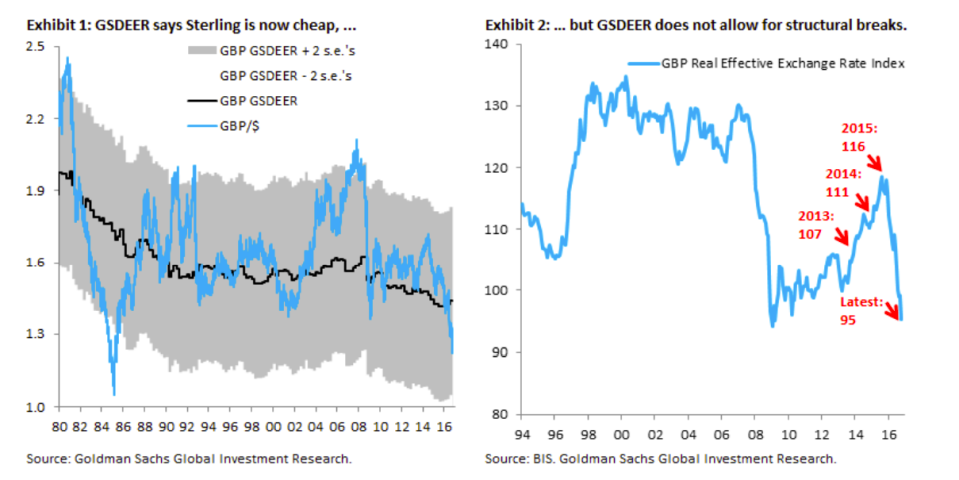GOLDMAN: The pound is so wild that our models can't work out how much it is worth

vhines200/Flickr (CC)
Correctly rating the value of the pound has become almost impossible since Britain's vote to leave the EU, according to new research circulated by Goldman Sachs.
Writing in a note titled "What is Fair Value for the British Pound?" — Goldman analysts Robin Brooks, Silvia Ardagna, and Michael Cahill argue that providing an accurate assessment of what the fair value of the pound is, using Goldman's standard Dynamic Equilibrium Exchange Rate (GSDEER) model, is proving difficult.
This is effectively because traditionally the pound is a pretty steady and stable currency, moving cyclically, and reacting to certain events like interest rate decisions, GDP releases, and trade shocks, rather than political events and chatter.
However, since the referendum sterling has been hugely jumpy, moving massively on small political developments, and falling 7% in a week on suggestions that we are heading for a hard Brexit — leaving the EU without any formal trade deal with the bloc.
As HSBC's David Bloom noted on the day of the pound's 'flash crash' — when it dropped 6% against the dollar in just two minutes in early October — "GBP has gone from a cyclical to a political and structural currency."
Goldman's analysts say that this move from cyclical to structural means that valuing sterling accurately is nigh on impossible. Here is the key quote (emphasis ours):
"Our starting point was that standard valuation models – such as our own GSDEER – are not well suited to address this question. This is because these models, which essentially amount to slow moving averages of the exchange rate (controlling for terms of trade shocks and productivity differentials), do not adjust for the kind of structural break that the referendum and potential for a “hard” Brexit surely represent."
As a result, Goldman's standard model suggests that the pound is substantially undervalued, something that Brooks, Ardagna, and Cahill dispute, saying later in the research that the pound needs to fall around 10% more to be valued accurately.
Here are Goldman's charts showing how poorly its standard models are tracking sterling right now:

vhines200/Flickr (CC)
That one of the world's biggest banks' forecasting for currencies cannot accurately provide fair value for one of the world's five top currencies is a pretty substantial indicator of just how uncertain things are in the UK, and just how big an adjustment Britain's economy is going through.
Earlier in October, for instance, both Citigroup and Morgan Stanley argued that Britain is now behaving — in some respects — like an emerging market, despite having been established as a global powerhouse for centuries.
NOW WATCH: Tour this $174 million superyacht complete with its own helipad and speedboat garage
See Also:
SEE ALSO: GOLDMAN SACHS: If we're right, the pound should fall another 10%
DON'T MISS: There's an argument that the crashing pound is the best thing that could happen to Britain right now

 Yahoo Finance
Yahoo Finance 
